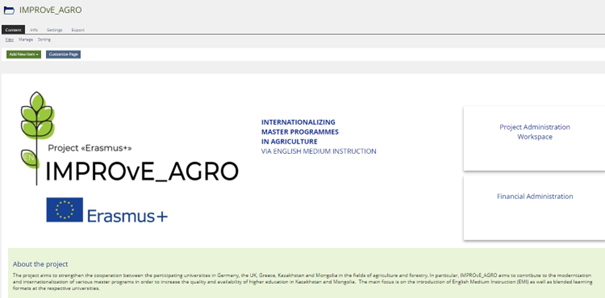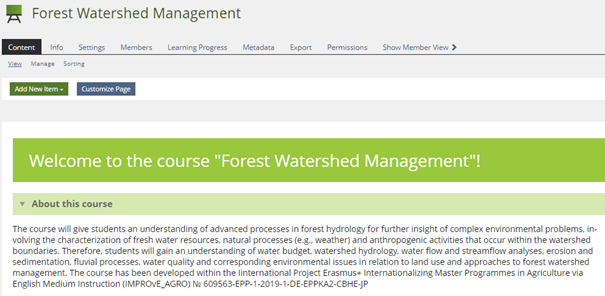
Background
Internationalizing higher education is of strategic importance for various countries in Central Asia, including Mongolia, Kazakhstan and, Russia. Therefore, English Medium Instruction is vital in higher education, for instance, in fields like Agriculture and Forestry, as it promotes access to resources, enhances opportunities, fosters cross-cultural collaboration, and aligns institutions with global standards, ultimately contributing to the development and competitiveness of the region's education sector.
Objectives
In our project we aimed to develop a model for modernizing and internationalizing Master programs in Agriculture and Forestry through EMI and Blended Learning. Other objectives were to enhance teaching capacities at the partner institutions by developing 16 new modules for their Master curricula corresponding to international quality standards, to design a trans-institutional e-learning platform for BL delivery, and to create opportunities for internationalization and academic mobility.
English Medium Instruction and Blended Learning delivery
English medium instruction in agriculture and forestry enhances global competitiveness and career opportunities for students by providing access to cutting-edge research, international collaborations, and educational resources. It also facilitates participation in global conferences and workshops, improving academic and professional mobility. Additionally, this approach promotes interdisciplinary learning and innovation, essential for sustainable management and economic development in these fields.
Blended learning, with its integration of synchronous and asynchronous methods, offers a flexible, engaging, and effective educational experience. It not only caters to diverse student needs and schedules but also enhances learning outcomes through varied instructional techniques and continuous engagement. This approach is increasingly vital in higher education, preparing students for the demands of a digital and interconnected world. Synchronous Learning refers to real-time, interactive instruction where students and instructors are online and engage at the same time. Examples include live lectures, webinars, and virtual classroom sessions where participants can ask questions and receive immediate feedback. Asynchronous learning refers to instruction that does not occur in real-time. Students access materials, complete assignments, and engage in discussions at their own pace. Examples include recorded lectures, discussion boards, online quizzes, and reading materials that students can review at any time.
Teaching and training activities (Blended Learning/Flipped classrooms and English Medium Instruction)
Blended Learning/Flipped classrooms and English Medium Instruction
The project focused on enhancing teaching methodologies and professional development for staff in agriculture and forestry education. The project aimed to improve the competencies of staff members in Agriculture and Forestry as well as English language instructors at all PC institutions and enhance their understanding of education policies and practices.
Workshops such as "Learning Outcomes" and "Methodology of Course Design" provided participants with practical tools and theoretical frameworks to improve their teaching strategies and curriculum development. Training sessions on topics like blended learning, AI in curriculum design, and quality assurance equipped staff with modern pedagogical approaches and technological tools. Moreover, presentations on internationalization experiences and quality assurance processes broadened participants' perspectives on global education trends and standards.
In total, 30 online or face-to-face teaching and training activities were offered in the period from Jan. 2022 until the end of project in January 2024 (for the full survey see the document “Teaching and training activities”).
Some examples:
- Workshops on Blended learning/flipped classrooms (online, 21.01.2022, 24.01.2022; 100 staff);
- Workshop on "Learning outcomes": online (18.02.2022; 12 staff);
- Workshop ‘Methodology of course design’ (21.02.23; 7 staff);
- Round table ’Tools for modernization of key modules in A&F (21.02.23; 18 staff);
- Workshop ‘Designing a linguistic corpus for A&F (14.06.2023; 9 staff).
- Workshop ‘Designing course descriptions (22.05 - 23.05.2023 ;16 staff)
Each partner country institution adapted the new courses to fit their local context, either by creating entirely new courses or by integrating the content into existing ones to update them. The courses offer between 4 and 5 ECTs. All these courses are accredited by their respective universities and are part of their Masters programs.
All 16 modules were developed on a joint E-learning platform (ILIAS) hosted by Freiburg University of Education and integrated into curricula, advancing internationalization in the MA programs of the partner institutions. All modules were developed for synchronous and asynchronous teaching enabling flexible delivery modes for face-to-face and online teaching.

All the courses employ a consistent teaching methodology developed as part of the project. This methodology is based on blended learning and follows a flipped classroom model. The courses are conducted in English and include detailed descriptions, learning outcomes, and unit-specific learning pathways that explain the types of learning activities involved. The activity types adhere to the ABC learning framework (https://abc-ld.org/6-learning-types/).

Course materials are divided into asynchronous and synchronous components. Asynchronous materials, mainly readings and lectures, focus on learning through acquisition with some investigation, and are prepared by students before class. Synchronous materials are active and learner-centered, allowing students to apply their acquired knowledge through various learning types, including investigation, practice, discussion, production, and collaboration.

Additionally, the courses incorporate principles of Content and Language Integrated Learning (CLIL), with activities designed to support students' understanding of the language through listening and reading exercises.
Results
Development of 16 modules for Master curricula
Four main areas in Agriculture and Forestry were identified in which the participants shared modules in their individual Master programmes:
- Forestry
- Plant protection
- Biotechnology
- Methodology in Agronomy and Crop science
Under these four disciplinary groupings 16 courses in total were prepared by the project partners in various inter-disciplinary Working Groups (IWGs):
Forestry: Forest Watershed Management, Planning of Urban Forestry, Multipurpose Forest Inventory, Dendroecology, Technology of Tree Planting in Multiple Regions
Plant Protection: Modern Plant Protection in Agriculture, Phytosanitary Monitoring and Environment, Plant-Microbial interactions
Biotechnology: Industrial Agrobiotechnology, Seed Production, Applied Plant Virology, Cellular Engineering of Plants
Methodology in Agronomy and Crop Science: Field Experimental Method and Statistical Analysis, Methodology of Plant Physiology, Research Methodology in Crop Science, Sustainable Natural Resource Management
Each partner country institution adapted the new courses to fit their local context, either by creating entirely new courses or by integrating the content into existing ones to update them. The courses offer between 4 and 5 ECTs. All these courses are accredited by their respective universities and are part of their Masters programs.
All 16 modules were developed on a joint E-learning platform (ILIAS) hosted by Freiburg University of Education and integrated into curricula, advancing internationalization in the MA programs of the partner institutions. All modules were developed for synchronous and asynchronous teaching enabling flexible delivery modes for face-to-face and online teaching.
Project dissemination
The dissemination events for the Erasmus+ project IMPROvE_AGRO have been conducted at multiple levels and through various channels to enhance engagement with stakeholders. These efforts align with the project's dissemination plan and aim to share achievements on institutional, national, and international scales. A full dissemination report, including events, websites, leaflets, social media, and photos, is available as a separate document.
- Websites
- Key dissemination tools include fully functional websites hosted by all participating universities, e.g.:
- PH Freiburg
- IMPROvE_AGRO muls.edu
- Toraighyrov University
- These websites serve to promote project objectives, track progress, publish results, and highlight partner contributions.
- Project Leaflets
- Leaflets have been produced in English, Russian, and Kazakh
- They provide concise information about the project's goals, objectives, consortium, and expected outcomes.
- E-Learning Platform
- The ILIAS e-learning platform at FUE serves as a collaborative workspace for project activities and material sharing.
- It hosts materials for all 16 modules in agriculture and forestry.
- Freiburg University of Education will maintain the platform for at least four years post-project, allowing universities to modify and add new materials.
- Online Dissemination Event
- In January 2022, a large online event on Blended Learning and Flipped Classroom was organized by the Mongolian University of Life Sciences and facilitated by Aston University and Freiburg University of Education.
- Over 100 participants attended from five schools at MULS, and lecturers from other project partners participated.
- Conferences and Seminars
- Dissemination events included conferences, such as in Pavlodar (KAZ) on October 29, 2023.
- Seminars were held for administrative staff, teaching staff, and master students, such as at the National University of Mongolia on March 21, 2022.
- Social Media and Media Outreach
- Social media platforms like Facebook and Instagram were used for dissemination at various universities.
- The project was featured on Mongolian National Broadcast (MNB TV) on October 10, 2023.
- Memorandum of Understanding (MOU)
- A MOU was signed between the Rector of the Mongolian University of Life Sciences and Kazakh National Agrarian Research University (Kazakhstan) for a joint master’s degree program on September 30, 2023.
- Engagement with Government Officials
- The project was introduced to high-level government officials, including the Prime Minister of Mongolia, the Minister of Education and Science, and the Rector of the National University of Mongolia.
- An event on June 30, 2023 in Ulaanba, showcased the project's contributions to research capacity improvement and the modernization of the Master’s program.
- Publications
- Participants from various universities have published articles related to the project.
- KazNARU published an article on internationalization through English teaching, presented at the XV International Scientific-Practical Conference in Astana, 2023.
- MULS produced an article about the project in the September 2023 issue of the Journal ‘Growing Gold’.
Conclusion
Overall, the Erasmus+ project has made significant strides in internationalizing Master programs in Agriculture and Forestry, in particular in the following fields:
- Methodology Development: A comprehensive methodology for internationalizing Master programs in Agriculture and Forestry has been developed, providing a structured approach for enhancing global perspectives in curriculum design and delivery.
- Staff Training: Professional development initiatives have successfully trained personnel at partner institutions, equipping them with the necessary skills and knowledge to instruct students in English.
- Modernization of Teaching Resources: Teaching resources have been modernized to align with contemporary pedagogical approaches, enhancing the quality of instruction and learning experiences for students.
- Curriculum Integration: Sixteen modules, incorporating blended learning and English Medium Instruction (EMI), have been seamlessly integrated into the curricula for A&F programs. Both synchronous and asynchronous materials have been developed, enabling flexible delivery modes for face-to-face and online teaching.
- ILIAS E-learning Platform: An ILIAS e-learning platform has been established to facilitate the delivery of modernized modules in Agriculture and Forestry. This platform provides a centralized hub for accessing learning materials and fostering collaboration among partner institutions.
- Increased Academic Mobility: The project has successfully increased the numbers of international academic mobility at partner Higher Education Institutions (HEIs). This has enriched the international experience of students, faculty, and staff, fostering cross-cultural exchange and collaboration.
Partners
The consortium included the following partners:
- Freiburg University of Education (Germany) – Coordinating university
- Aston University (UK)
- Aristotle University of Thessaloniki (Greece)
- Kazakh National Agrarian Research University (Kazakhstan)
- Toraighyrov Pavlodar State University (Kazakhstan)
- Mongolian University of Life Sciences (Mongolia)
- National University of Mongolia (Mongolia)
In addition, the following universities were also part of consortium from 2019 to 2022:
- Tyumen State University (Russia)
- Altai State University (Russia)
- Krasnoyarsk State Agrarian University (Russia)
Implementation
The Implementation of the Erasmus+ project included the following activities:
1. Coordinating needs with partner institutions for quality assurance
2. Delivering staff development courses, e.g. concerning curriculum design and blended learning
3. Developing EMI and blended learning modules to international standards
4. Facilitating academic mobility (in total, there were 8 mobilities)
5. Establishing e-learning capacity
6. Overseeing management and quality control
7. Disseminating project results widely

